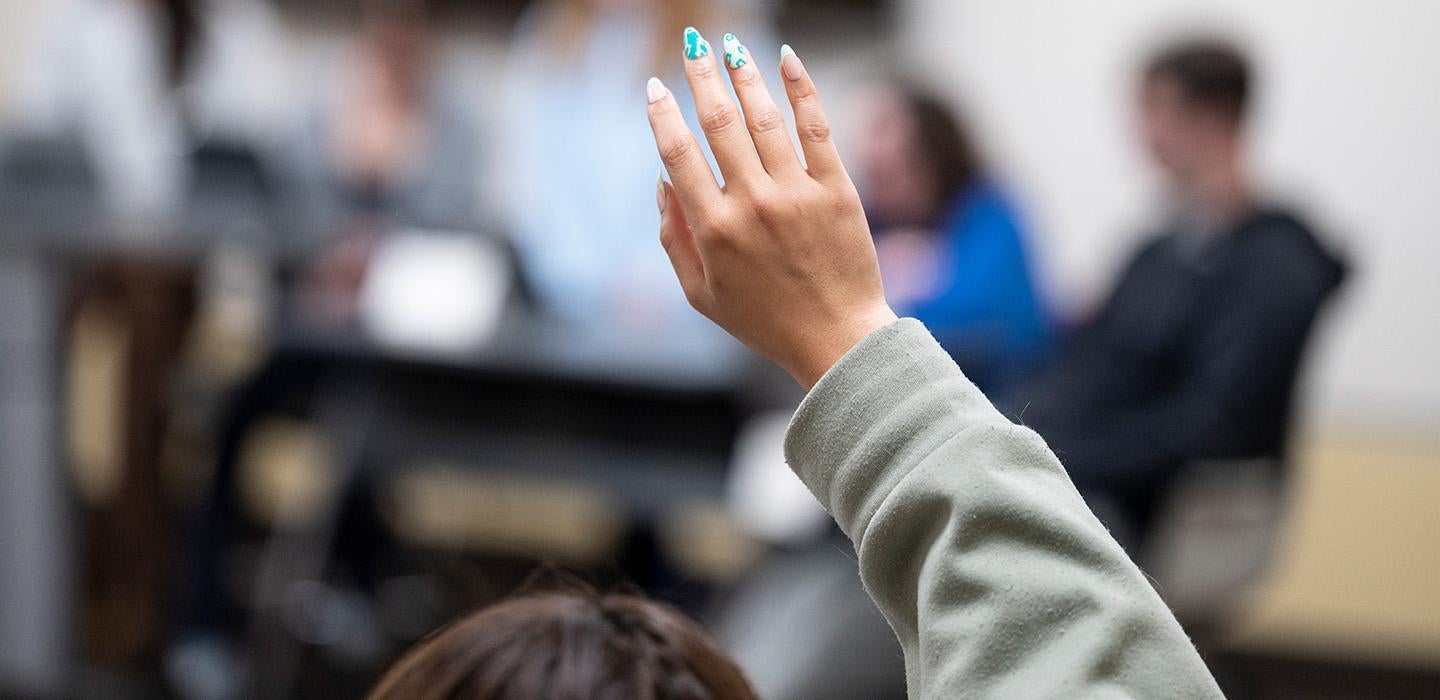
Subscribe to 51ūŦÆ·ĘÓÆĩwire Today
Get the most interesting and important stories from the 51ūŦÆ·ĘÓÆĩ.As the 51ūŦÆ·ĘÓÆĩ extends its Year of Discourse and Dialogue into 2024-25, it hosted an April capstone event that showcased Provost-funded projects aiming to foster meaningful conversations about race, the First Amendment, managing freedom of expression on campus and more.
The Year of Discourse and Dialogue capstone event, âDeveloping Capacity for Discourse and Dialogue Across Our Campuses,â drew faculty, staff and students to the University Club for presentations and panel discussions that emphasized the importance of understanding diverse perspectives and developing respectful conversations within the University community to create a more inclusive and intellectually stimulating environment.
Graduate School of Public and International Affairs Dean Carissa Slotterback and Vice Chancellor for Equity, Diversity and Inclusion Clyde Pickett, co-chairs for the Year of Discourse and Dialogue, hosted the event featuring several speakers, including Chancellor Joan Gabel, Provost Joe McCarthy, Interim Vice Provost for Student Affairs and Dean of Students Carla Panzella, former Vice Provost for Student Affairs Kenyon Bonner and more.
Also showcased were various projects from across the University that contribute to fostering discourse and dialogue, including the and the Collaboratory Against Hate.
Here are five key takeaways from the capstone:
Embrace differences
One central theme was the importance of leaning into differences of perspective, experience and identity. Participants emphasized the need to acknowledge and engage with diversity rather than shy away from it.
Cheryl Ruffin, former institutional equity manager in 51ūŦÆ·ĘÓÆĩâs Office for Equity, Diversity and Inclusion, highlighted 51ūŦÆ·ĘÓÆĩâs Racial Equity Consciousness Institute (RECI), a program that helps build participantsâ active listening, cultural engagement and capacity to embrace differences â all essential tools for building understanding and strengthening relationships.
âWe have to lean into those differences,â Ruffin said. âItâs when we try to run or escape that conflict occurs because weâre operating out of fear. Differences are just a part of human behavior. Thatâs just who we are.â
Build community norms
Veella Grooms, assistant vice chancellor for equity and inclusion, encouraged the use of restorative practices, which help establish clear expectations for behavior and engagement to guide conversations and interactions. With restorative practices, individuals can create spaces where diverse perspectives are respected and valued, she said.
âRestorative practice is intended to bring people together in conversation and action and itâs intended to do that specifically for those that have differences,â Grooms said. âWeâre focused on how we address that harm as opposed to constantly looking for ways to escalate it and complain about it. We want to try to mediate it or find a way that we can resolve the issue.â
Think ahead
Multiple panelists emphasized the need to proactively address complex issues on campus. Planning for potential challenges, such as controversial speaker events, allows institutions to better navigate conflicts, mitigate risks and develop strategies for effective communication and resolution.Ėý
âWeâre never going to be able to address every incident that happens, but if we are coming together and talking about the âwhat ifs,â then that's going to help us be better prepared,â Grooms said.
Learn about the First Amendmentâs complexities
While the law may protect certain forms of speech, itâs equally vital to exercise discernment and moral judgment in deciding what should be said, according to School of Law Professor William Carter Jr. Individuals and institutions are responsible for upholding principles of respect, empathy and integrity, even in contexts where freedom of speech is protected by law, he added.
âThere is also a difference between what the law permits and what is wise. I tell my students all the time that the fact that we have the right to say something doesn't always make it the right thing to say,â Carter said. âSometimes self-restraint, even if not required, is desirable.â
Keep practicing
Samantha Balbier, director of the Institute of Politics, underscored the value of providing students with opportunities to engage in dialogue, challenging them to actively listen and reflect on differing viewpoints.
âOur goal is to give our students an opportunity to have greater agency and to think about how can they learn from discussions that are happening,â Balbier said. âHow can we challenge them to hear something, to be that willing listener and then to be able to reflect on what they hear âĶ whether they agree with it or not.â
Ėý
Photography by Aimee Obidzinski


